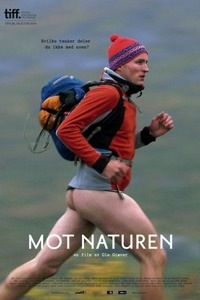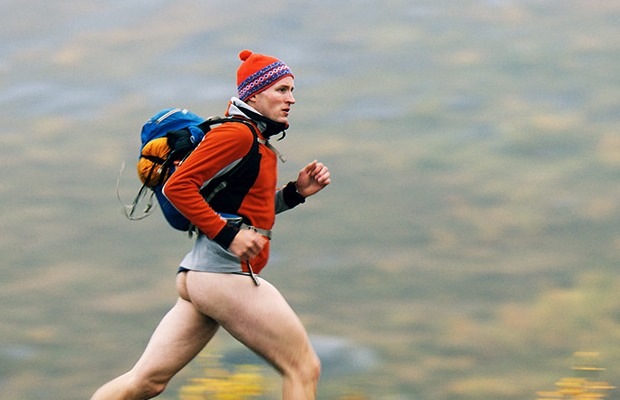Reviews
Out of Nature | 2014 TIFF Review
A Hollow World of Obligations
 Ole Giæver’s sophomore feature, Out of Nature, very much resembles—in setting, structure and thematic preoccupation—his short film work and prior, less effective, feature effort, Fjellet. Like those works, his latest similarly presents a situation where enlightenment and introspection stems from one’s engagement with nature, only the template is less manufactured and more intimate, making the obviousness of the metaphor far more palatable.
Ole Giæver’s sophomore feature, Out of Nature, very much resembles—in setting, structure and thematic preoccupation—his short film work and prior, less effective, feature effort, Fjellet. Like those works, his latest similarly presents a situation where enlightenment and introspection stems from one’s engagement with nature, only the template is less manufactured and more intimate, making the obviousness of the metaphor far more palatable.
Here, Martin (played by Giæver himself), a meek, diffident man lacking basic social skills plans an escape to the mountains for the weekend, leaving his wife (Marte Magnusdotter Solem) and son (Sivert Giæver Solem) behind despite some unspoken tensions. This sojourn, which consists of Martin’s persisting inner-dialogue accompanying images of him hiking, running, sitting around, pissing and occasionally masturbating, is a passive-aggressive act of empowerment unto itself. Rather than confront the problems in his life, he flees from them and avoids them. His voiceovers are as enraged as they are indulgent, vacillating between fantasy ideations where he develops a backbone in awkward situations and textbook resentment of the constraints that his wife and child represent.
Martin’s anxieties represent a very generalized, middle-class voice; one of emasculation and fear of irrelevance stemming from an inability to conquer the world with power and sexual conquests. That he spends his time contemplating the life he’d live if free from his wife—the women he’d screw, the liquor he’d drink and the weight he’d gain—isn’t particularly surprising, nor is it vital. What makes it work in the context of this film is the naïve simplicity of it and lack of self-consciousness Giæver demonstrates in presenting his less flattering characteristics. Though his dreams of receiving fellatio from a local shopkeeper while jerking off behind a tree should generate a generalized distaste in a Catholic repression capacity, the fact that he looks so pathetic standing in a field with his pants down, and the fact that a hunter happens upon him, diminishes the perceived (though not actual) predatory nature of such an act. Martin is a bit of a joke—a hapless loser—making his contemplations about what he’d do if his wife died less appalling than it is pathetic and amusing.
With the threat removed and any seriousness of consequence seeming unlikely, despite the occasional flashback or artistic insert of Martin’s wife wandering through the woods, Out of Nature plays very much like an insular comedy for men of a certain age that can relate to the banality and lack of originality of Martin’s concerns. In this sense, the loose style and persisting need to show our protagonist in embarrassing, degrading situations, works quite effectively for what little this film has to offer. It’s true that the notion of isolation exaggerating introspection and the notion of nature as instigator for confronting the instincts typically repressed on polite society is a tad twee but there’s never a sense that Giæver is trying to suggest that it’s more than it is.
More interesting than this text itself, which is serviceable for what it tries to be, is what it inadvertently represents within the context of gender relations. While the idea of a graceless man stumbling around in the woods naked while fantasizing about the pussy he could get if his wife wasn’t in the way is as culturally ubiquitous as it is non-threatening to a heteronormative status quo, the sense of outrage that might occur if Martin were a woman fantasizing about ditching her husband to indulge in her sexuality says more about modern society than this film could even conceive.
For example, the hostility directed at Sarah Polley’s Take This Waltz and even the recent adaptation of Anna Karenina by a primarily male audience—the world of film criticism and writing being an astonishingly insular, male one where different voices are unwelcome—suggests that gender politics haven’t progressed quite as far as our surface laws and claims of equality might imply. If Martin were a woman, this movie wouldn’t play as comedy in the same capacity nor would it have as broad an audience. Instead, our female protagonist would be chastised for her behaviour and the film would be dismissed as pretentious, indulgent or, by less articulate folks, “bad.” But, as it stands, Out of Nature is quite accessible and playful. Just don’t watch it as a double bill with Catherine Breillat’s A Ma Soeur.
Reviewed on September 6th at the 2014 Toronto International Film Festival – Contemporary World Cinema Programme. 80 Minutes
★★★/☆☆☆☆☆
Robert Bell is a Toronto-based film critic for IONCINEMA.com and Exclaim! Magazine, where he was also the editor for film festivals and books. Robert covers North American Film Festivals such as Sundance, Hot Docs, Tribeca and TIFF. Robert studied film theory and screenwriting at York University and has a background in independent film production. Top Films From Contemporary Film Auteurs: Campion (The Piano), Kiarostami (Certified Copy), von Trotta (Hannah Arendt), Marsh (The Theory of Everything), Haneke (The White Ribbon), von Trier (Antichrist), Seidl (Dog Days), Moodysson (Lilya 4-Ever), Ramsay (Ratcatcher). Winterbottom (The Claim), Malick (The Tree of Life), Ceylan (Once Upon a Time in Anatolia), Cronenberg (Dead Ringers), Verhoeven (Starship Troopers), Bigelow (Point Break), Jordan (The Crying Game), The Dardennes (Lorna's Silence), Zyvagintsev (The Return), Porumboiu (Police, Adjective), Ozon (Dans la Maison).






















